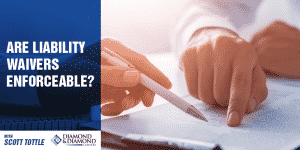#AskScottTottle
If you are uncertain of its meaning when someone mentions a liability waiver, you’re in good company. Few people aside from lawyers and people working for insurance companies understand the full impact of a liability waiver, but many people put their signatures on them without hesitation. Chances are pretty good that you signed a liability waiver when you went skiing this winter and purchased the lift pass or rented skis. Before setting out for a day kayaking on your favorite river, you probably had to sign a liability waiver before joining your guide who would be leading the group. The legal effect of these documents are not as clear as you might expect considering how frequently you are asked to sign one of them.
What is a liability waiver?
Businesses and organizations may resort to the use of waivers to protect themselves from being held responsible if a person making use of the products or services being offered is injured in an accident. Waivers are common in industries involving risky activities, such as the following:
- Skiing
- Snowboarding
- Tobogganing
- White-water rafting
- Horseback riding
- Canoeing
As a practical matter, participants in most organized athletic events, such as baseball, football and soccer.
Liability waivers are a contractual agreement between the business or organization and another party transferring risk to the party participating in the particular activity. It could be a separate agreement or it could be included as a provision in a rental contract or other agreement between the parties.
 What is the effect of a Waiver of Liability?
What is the effect of a Waiver of Liability?
The enforceability of a liability waiver in Canada depends upon its language and the understanding of the parties when they agreed to its terms. A person asked to sign a waiver before participating in an activity is accepting the risks associated with it and agreeing not to hold the other party responsible in the event of an accident and injury.
For example, organizers of a softball tournament might ask participants to sign a liability waiver accepting the risk of injury during the games. A player injured during a game by tripping in a hole in the outfield could be prevented from suing the organizers for compensation based upon the waiver signed by the player, but there could be exceptions available under the law.
If the accident and injury occurred in Ontario, the Occupiers’ Liability Act could prevent those in control of the premises from relying upon a waiver of liability. Under the law, an occupier of premises might be protected by a liability waiver provided the occupier acted reasonably with regard to maintaining the property and keeping it in a reasonably safe condition. Negligence on the occupier’s part, such as allowing a hole to remain on a baseball field, prevents courts from enforcing the liability waiver in the event of a claim by someone injured due to the occupier’s negligence.
People must know what they are signing
Because someone is giving up a significant right by signing a liability waiver, its terms must be clear and understandable by the person signing it. The person must know what rights are being waived and, although it might seem obvious, the fact the document they are signing is a waiver of liability.
A liability waiver included as part of another document might not be enforceable if the party signing it did not realize it was a waiver. The burden is on the party relying on the waiver to prove it was clear and unambiguous.
Ontario personal injury lawyers
Anyone injured due to the negligence of another party should speak with personal injury lawyers at Diamond and Diamond. Their years of successfully handling compensation claims make them the ideal source for legal advice about liability waivers. Call their 24/7 injury hotline at 1-800-567-HURT or visit their website to speak to someone now. They offer free consultations and case evaluations to injured victims throughout Ontario.











 What is the effect of a Waiver of Liability?
What is the effect of a Waiver of Liability?


